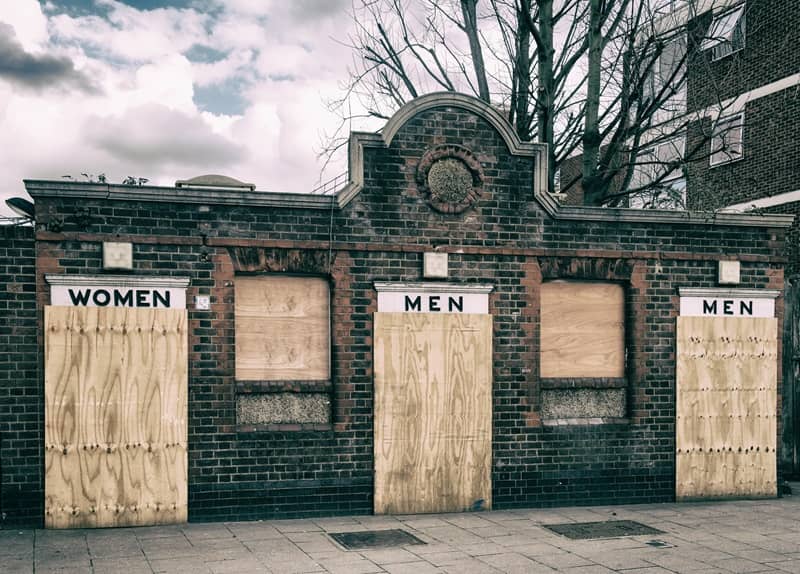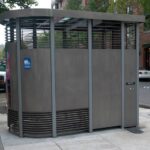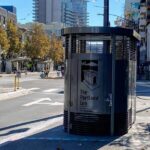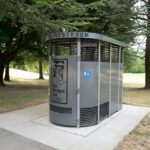“The Portland Loo, a stand-alone public toilet used in numerous states, is an example of “crime prevention through environmental design” and hostile architecture. Law enforcement...
Read more... January 28, 2023
January 28, 2023

Public toilets get a bad political wrap. A few high-profile commode calamities have made these facilities a third rail of local politics. Horror stories of exorbitant projects, unreasonable delays, and short lifespans have struck fear into even the most well-meaning local leaders. While no government official wants their name associated with a costly scandal, ignoring the need for restrooms only creates more problems. Part of realizing the advantage of public restrooms is understanding the full costs of avoiding this fundamental need.
Increased sanitation costs
Turning a blind eye to the need for public restrooms can lead to steep increases in sanitation costs. Many cities are fighting a losing battle trying to keep public spaces clear of human defecation and urination while refusing to provide sufficient restrooms. For instance, San Francisco spends well over $800,000 annually specifically on cleaning up human waste on the streets. Dubbed the “Poop Patrol”, this specialized unit makes up a considerable chunk of the city’s overall street cleaning budget.
Negative impact on vulnerable populations
The burden of the public restroom shortage disproportionately weighs on the most vulnerable populations of society such as the houseless, elderly, and differently-abled. These groups often face heightened social stigma, worsened health conditions, and increased isolation when their needs aren’t properly met. These costs don’t remain in the social realm as they can exacerbate public health expenses too. Everyone is better off when a city addresses the needs of the most at-risk.
Harm to the local environment
Cities with inadequate restroom options also suffer an environmental blow. With no official place to “go”, people are forced to find alternatives. The damage on streets and sidewalks is more obvious to the public, but parks take a serious toll too. Human waste severely disrupts local ecosystems, making it harder for flora and fauna to survive. This seriously inhibits greenery efforts and sustainability policies which most cities invest a lot of time and money pursuing.
Loss of business and tourism.
One of the major knock-on effects of unsanitary streets, sidewalks, plazas, and other public places is the loss of business. Highly populated areas tend to take the hardest economic hit given the density of businesses and people. Local companies — mostly mom-and-pop shops — inevitably see a drop in revenue as people stop frequenting these spots. Eventually, tourism suffers too as out-of-towners catch wind of the unsavory conditions on the ground.
Decrease in population
A loss in business isn’t the only downstream effect of insufficient restroom options. Cities across the US are seeing steep population declines. Unquestionably, a decrease in living standards plays a role in this departure. This flight of people can happen on any scale whether an entire metropolis or neighborhood, and the long-term effects are equally painful. When people don’t feel their needs are being met, they’ll seek out places that do.
Court costs and legal proceedings.
It’s not just a catchy slogan to say bathrooms are a fundamental human right; it’s the truth. Major cities have already been brought to task for insufficient facilities. For example, San Diego was the subject of a major inquiry following a deadly hepatitis A outbreak. A grand jury report cited the city’s lack of public toilets as a core cause. Court proceedings are notoriously time-intensive and resource-draining no matter how rulings go, especially for local governments on tight budgets.
The current state of public restrooms has led officials to wrongly believe that their costs are higher than the problems caused by not having them. The Portland Loo proves that public restrooms can be economically viable and socially responsible. All it took was a revolutionary city-focused design. Over 20 different cities across the world are realizing the full spectrum of benefits of having sufficient public restrooms while avoiding the costs of ignoring this crucial need.
If you’re interested in bringing a Loo to your city, check out our proven tips here. Have some questions? Feel free to contact us!





 January 28, 2023
January 28, 2023
“The Portland Loo, a stand-alone public toilet used in numerous states, is an example of “crime prevention through environmental design” and hostile architecture. Law enforcement...
Read more... January 1, 2023
January 1, 2023
“I’m thrilled for all the folks downtown that need it and will use it.”
Read more... November 28, 2022
November 28, 2022
“I’m convinced Portland is the only city in the U.S., and maybe the world, that celebrates the opening of bathrooms.” 08/29/2012 Published in Los Angeles...
Read more... September 16, 2022
September 16, 2022
"The freestanding restroom is durable and designed well to integrate into most environments."
Read more... September 7, 2022
September 7, 2022
"For the residents of Portland, Ore., taking a whiz in a public toilet is not just a matter of necessity. It’s an act of civic...
Read more... March 6, 2022
March 6, 2022
"There are two things about this toilet that are interesting. First of all, the sink is outside. So that sort of encourages people not to...
Read more... February 3, 2022
February 3, 2022
Portland Loo! This is such a clutch restroom! It's so conveniently located, right on the roundabout that goes around the Torch of Friendship, downtown San...
Read more... December 14, 2021
December 14, 2021
"Not only does it support access to a basic human need for all members of our community, it supports visitation by families and takes the...
Read more... November 18, 2021
November 18, 2021
“It’s a very safe, very healthy, very easy public toilet to maintain.”
Read more... June 8, 2021
June 8, 2021
"In Oregon, the City of Portland is doing its best to serve a toilet-starved public by providing what it calls, The Portland Loo. And here’s...
Read more... June 8, 2021
June 8, 2021
"From Portland, Oregon, the iconic Portland Loo prevents common restroom problems such as graffiti and other vandalism, prostitution, and drug use through clever design, allowing...
Read more... August 29, 2019
August 29, 2019
"We could have paid for the Portland Loo in what we’re spending for repairs and maintenance on the existing facility. Having seen the Portland Loos...
Read more... July 5, 2019
July 5, 2019
"You can see enough to help prevent crime and keep the place clean. You can see feet and determine if there is more than one...
Read more... May 29, 2019
May 29, 2019
The others couldn’t ensure the safety we needed. "One of the key things in regard to downtown washroom facilities that you’re seeing throughout North America...
Read more... March 12, 2019
March 12, 2019
“It seems to have got a lot of the design aspects of a great public washroom right. It’s been called the perfect public toilet and...
Read more... March 11, 2019
March 11, 2019
“They don’t have attendants, but they’re very, very challenging to abuse, so to speak,” Lowe said. “The hand-washing station is on the outside. It has...
Read more... August 6, 2018
August 6, 2018
This is an authentic urban place and we welcome everybody here — from homeless kids to global leaders…The toilet is really located right in the...
Read more... June 11, 2018
June 11, 2018
“The Portland Loo, a unique, patented outdoor bathroom that inspires such worship in its fanbase you’d think that Steve Jobs himself had designed it. This...
Read more... February 28, 2018
February 28, 2018
“This is free-standing, really, the top of the line as far as what we want because they need to be indestructible,” Published in CBC British...
Read more... February 1, 2018
February 1, 2018
“Portland Loos are the only public toilets with their own social media accounts. And a Portland Loo in Vancouver, B.C. was voted the best public...
Read more... January 22, 2018
January 22, 2018
Bathrooms in public spaces is a necessity. Urban centers are faced with serious questions of ease of installation and use, security, durability and life cost...
Read more... November 6, 2016
November 6, 2016
The Victoria Loo isn’t known for being lavish, but the stainless steel, unisex toilet provides an eco-friendly, convenient and free service that appealed to the...
Read more... March 4, 2025
March 4, 2025
We chose The Portland Loo for Reno because it’s sturdy and safe, incorporates several features to discourage undesirable use, and has significantly lower installation and...
Read more... February 26, 2025
February 26, 2025
“This restroom can accommodate everyone, and we’re dedicated to having it clean [and] having it safe”
Read more... February 25, 2025
February 25, 2025
“In the last five years that it’s been out, it’s been immediately engrained in the fabric of the neighborhood,” [...] “I’ve talked to residents, I’ve...
Read more... February 12, 2025
February 12, 2025
I always appreciate your facilities and want to see public bathrooms become a norm in the US! Thank you for being part of that solution!
Read more... November 21, 2024
November 21, 2024
“To date, we have received nothing but positive feedback from local residents. City bylaw officers have also reported positive effects downtown.”
Read more... November 21, 2024
November 21, 2024
"Fewer incidents of public urination and defecation have been reported since the installation in July of the Portland Loo public toilet downtown."
Read more... November 6, 2024
November 6, 2024
Public bathrooms are critical — I’m so glad this company exists.
Read more... November 4, 2024
November 4, 2024
Our Grand Opening in Cumberland Historic City Center is next week. As a small business merchant…. I love what the Portland Loo is going to...
Read more... October 22, 2024
October 22, 2024
“We didn’t encounter any safety issues. No maintenance issues. We didn’t even lock them up at night.” Read the full article here
Read more... October 22, 2024
October 22, 2024
“The Portland Loos coming to Cleveland are a response to both the growing need for public toilets and the demands of a burgeoning Downtown as...
Read more... August 5, 2024
August 5, 2024
"A team of three public restroom specialists visit the Phlushes regularly and, along with cleaning and unclogging the toilets daily (yes, daily), they also speak...
Read more... June 13, 2024
June 13, 2024
When I saw The Portland Loo in San Antonio I made a mental note of its location while shopping and dining and continued with my...
Read more... May 26, 2024
May 26, 2024
"The problems that we have with park restrooms, (Portland) has alleviated all of those, essentially by using this ‘Portland Loo'."
Read more... April 22, 2024
April 22, 2024
Love this public bathroom design! Complete privacy and great ventilation so it's not smelly at all.
Read more... April 1, 2024
April 1, 2024
The Loo is such a brilliant design, and executed so well. Kudos to you all!
Read more... January 28, 2024
January 28, 2024
Bathrooms in public spaces is a necessity. Urban centers are faced with serious questions of ease of installation and use, security, durability and life cost...
Read more... January 28, 2024
January 28, 2024
“This is a basic human need. It’s something that everybody needs. Yes, we have people that have a higher need because people are unhoused, or...
Read more... January 28, 2024
January 28, 2024
“They’re made of “highly durable” heavy-gauge stainless steel wall panels with an anti-graffiti coating and open louvers at the bottom and top to permit public...
Read more... October 18, 2023
October 18, 2023
"This Portland-made, free-to-use, stand-alone toilet is working to address common public bathroom concerns."
Read more... August 23, 2023
August 23, 2023
These need to be in every city across America.
Read more... June 19, 2023
June 19, 2023
We have been pleased with the performance of the Portland Loo. We look forward to adding more in the near future.
Read more... June 14, 2023
June 14, 2023
I personally have heard nothing but good things from the public about our loo after it went in, particularly related to that being a model...
Read more... January 28, 2023
January 28, 2023
“The Portland Loo, a stand-alone public toilet used in numerous states, is an example of “crime prevention through environmental design” and hostile architecture. Law enforcement...
Read more... January 1, 2023
January 1, 2023
“I’m thrilled for all the folks downtown that need it and will use it.”
Read more... November 28, 2022
November 28, 2022
“I’m convinced Portland is the only city in the U.S., and maybe the world, that celebrates the opening of bathrooms.” 08/29/2012 Published in Los Angeles...
Read more... September 16, 2022
September 16, 2022
"The freestanding restroom is durable and designed well to integrate into most environments."
Read more... September 7, 2022
September 7, 2022
"For the residents of Portland, Ore., taking a whiz in a public toilet is not just a matter of necessity. It’s an act of civic...
Read more... March 6, 2022
March 6, 2022
"There are two things about this toilet that are interesting. First of all, the sink is outside. So that sort of encourages people not to...
Read more... February 3, 2022
February 3, 2022
Portland Loo! This is such a clutch restroom! It's so conveniently located, right on the roundabout that goes around the Torch of Friendship, downtown San...
Read more... December 14, 2021
December 14, 2021
"Not only does it support access to a basic human need for all members of our community, it supports visitation by families and takes the...
Read more... November 18, 2021
November 18, 2021
“It’s a very safe, very healthy, very easy public toilet to maintain.”
Read more... June 8, 2021
June 8, 2021
"In Oregon, the City of Portland is doing its best to serve a toilet-starved public by providing what it calls, The Portland Loo. And here’s...
Read more... June 8, 2021
June 8, 2021
"From Portland, Oregon, the iconic Portland Loo prevents common restroom problems such as graffiti and other vandalism, prostitution, and drug use through clever design, allowing...
Read more... August 29, 2019
August 29, 2019
"We could have paid for the Portland Loo in what we’re spending for repairs and maintenance on the existing facility. Having seen the Portland Loos...
Read more... July 5, 2019
July 5, 2019
"You can see enough to help prevent crime and keep the place clean. You can see feet and determine if there is more than one...
Read more... May 29, 2019
May 29, 2019
The others couldn’t ensure the safety we needed. "One of the key things in regard to downtown washroom facilities that you’re seeing throughout North America...
Read more... March 12, 2019
March 12, 2019
“It seems to have got a lot of the design aspects of a great public washroom right. It’s been called the perfect public toilet and...
Read more... March 11, 2019
March 11, 2019
“They don’t have attendants, but they’re very, very challenging to abuse, so to speak,” Lowe said. “The hand-washing station is on the outside. It has...
Read more... August 6, 2018
August 6, 2018
This is an authentic urban place and we welcome everybody here — from homeless kids to global leaders…The toilet is really located right in the...
Read more... June 11, 2018
June 11, 2018
“The Portland Loo, a unique, patented outdoor bathroom that inspires such worship in its fanbase you’d think that Steve Jobs himself had designed it. This...
Read more... February 28, 2018
February 28, 2018
“This is free-standing, really, the top of the line as far as what we want because they need to be indestructible,” Published in CBC British...
Read more... February 1, 2018
February 1, 2018
“Portland Loos are the only public toilets with their own social media accounts. And a Portland Loo in Vancouver, B.C. was voted the best public...
Read more... January 22, 2018
January 22, 2018
Bathrooms in public spaces is a necessity. Urban centers are faced with serious questions of ease of installation and use, security, durability and life cost...
Read more... November 6, 2016
November 6, 2016
The Victoria Loo isn’t known for being lavish, but the stainless steel, unisex toilet provides an eco-friendly, convenient and free service that appealed to the...
Read more... March 4, 2025
March 4, 2025
We chose The Portland Loo for Reno because it’s sturdy and safe, incorporates several features to discourage undesirable use, and has significantly lower installation and...
Read more... February 26, 2025
February 26, 2025
“This restroom can accommodate everyone, and we’re dedicated to having it clean [and] having it safe”
Read more... February 25, 2025
February 25, 2025
“In the last five years that it’s been out, it’s been immediately engrained in the fabric of the neighborhood,” [...] “I’ve talked to residents, I’ve...
Read more... February 12, 2025
February 12, 2025
I always appreciate your facilities and want to see public bathrooms become a norm in the US! Thank you for being part of that solution!
Read more... November 21, 2024
November 21, 2024
“To date, we have received nothing but positive feedback from local residents. City bylaw officers have also reported positive effects downtown.”
Read more... November 21, 2024
November 21, 2024
"Fewer incidents of public urination and defecation have been reported since the installation in July of the Portland Loo public toilet downtown."
Read more... November 6, 2024
November 6, 2024
Public bathrooms are critical — I’m so glad this company exists.
Read more... November 4, 2024
November 4, 2024
Our Grand Opening in Cumberland Historic City Center is next week. As a small business merchant…. I love what the Portland Loo is going to...
Read more... October 22, 2024
October 22, 2024
“We didn’t encounter any safety issues. No maintenance issues. We didn’t even lock them up at night.” Read the full article here
Read more... October 22, 2024
October 22, 2024
“The Portland Loos coming to Cleveland are a response to both the growing need for public toilets and the demands of a burgeoning Downtown as...
Read more... August 5, 2024
August 5, 2024
"A team of three public restroom specialists visit the Phlushes regularly and, along with cleaning and unclogging the toilets daily (yes, daily), they also speak...
Read more... June 13, 2024
June 13, 2024
When I saw The Portland Loo in San Antonio I made a mental note of its location while shopping and dining and continued with my...
Read more... May 26, 2024
May 26, 2024
"The problems that we have with park restrooms, (Portland) has alleviated all of those, essentially by using this ‘Portland Loo'."
Read more... April 22, 2024
April 22, 2024
Love this public bathroom design! Complete privacy and great ventilation so it's not smelly at all.
Read more... April 1, 2024
April 1, 2024
The Loo is such a brilliant design, and executed so well. Kudos to you all!
Read more... January 28, 2024
January 28, 2024
Bathrooms in public spaces is a necessity. Urban centers are faced with serious questions of ease of installation and use, security, durability and life cost...
Read more... January 28, 2024
January 28, 2024
“This is a basic human need. It’s something that everybody needs. Yes, we have people that have a higher need because people are unhoused, or...
Read more... January 28, 2024
January 28, 2024
“They’re made of “highly durable” heavy-gauge stainless steel wall panels with an anti-graffiti coating and open louvers at the bottom and top to permit public...
Read more... October 18, 2023
October 18, 2023
"This Portland-made, free-to-use, stand-alone toilet is working to address common public bathroom concerns."
Read more... August 23, 2023
August 23, 2023
These need to be in every city across America.
Read more... June 19, 2023
June 19, 2023
We have been pleased with the performance of the Portland Loo. We look forward to adding more in the near future.
Read more... June 14, 2023
June 14, 2023
I personally have heard nothing but good things from the public about our loo after it went in, particularly related to that being a model...
Read more...
